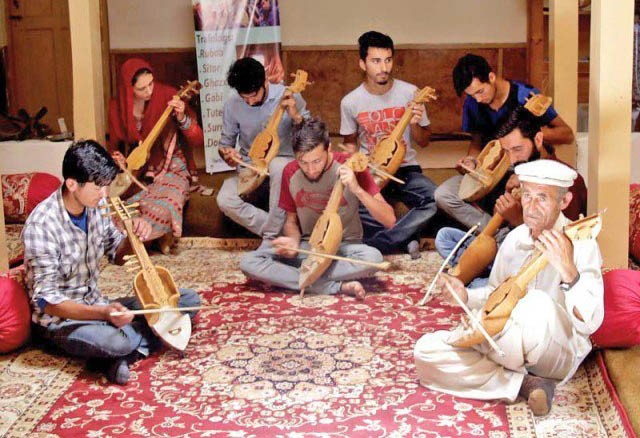
The teaching of music in schools in the country is a pipe dream given the growing conservatism of the country’s middle classes, but Gilgit Balisttan is defying such notions

The formal teaching of music in Pakistan has always run an uneasy course. Except for a couple of institutions at the university level, that too of musicology and not music, there is no teaching of the practice of music in schools, but now it appears that a door has been opened with the initiative launched recently to introduce music in the syllabi of schools in Gilgit-Baltistan. As reported, the launch ceremony of the project was held in Aliabad, Hunza, attended by a large number of local people, including women, artists and school children. As school children played folk music and sang songs in local languages and in Urdu, the music teachers also presented their music in the event. Aziz Ali Dad, a noted scholar presided over the ceremony, while Sherbaz Ali Khan, a renowned poet of Burushaski language was the chief guest.
Idara Baraae Taleem-e-Taraqi (IBT), a Swat-based organization, has launched the ‘Pakistan Mountain Folk Music School Integration’ project in Gilgit, Hunza and Ghizer districts. The project funded by USAID through its small grants and ambassador funds programme is based on the concept of integrating the folk music of four communities -- Shina, Wakhi, Burushaski and Khowar -- in schools of the area: Gaukoch, Gilgit, Gojal, Shapurson and Shimshal. In addition to the teaching of folk music at the selected schools the project also aims at producing a curriculum for music to be incorporated in schools.
Another initiative has been started in the area for the preservation of folk and local music, which like the languages, in also under great threat. The indigenous music school Bulbulik and its roots can be traced back to 1995 when a small school was set up by one Muzafaruddin Shah to create awareness about protecting one’s own melodies. The present initiative is about a year old, the first folk music school in the area that has given opportunities to female students to learn alongside males.
As language disappears, so do old compositions with it and the rich music history. In the entire Gojal Valley, Ustad Rehmatullah Baig who teaches at Bubulik is the only living ghazxek player left. There may be little support but that has not discouraged the institution from playing freestyle/Pamiri music with conventional instruments like ghazxek, surnaya, tutek, gabi, gharba and Chitrali sitar. Run by Gulmit Educational and Social Welfare Society, Bubulik is named after nightingales which are frequently mentioned in Persian and Urdu poetry. The region is also known as ‘The Land of Languages’ for it comprises diverse ones like Shina, Balti, Burushaski, Wakhi and Khwar. Unfortunately, they are all under threat of extinction. Unesco has listed Wakhi as one of the world’s most endangered cultures.
The Wakhi people refer themselves as ‘Khik’ who migrated to Hunza from the Wakha Khan Corridor. They also live in China, Tajikistan and Afghanistan and the Wakhi language -- called ‘Khik Zik’ -- is an Eastern Iranian one. It is also very unique and still does not have a written form.
South Asia has nourished a grand tradition of music which can be traced back through documented evidence to thousands of years, while the local tradition and the folk musical forms either got integrated into that grand scheme or were sidelined as something minor and of no great significance. The areas which formed the fringe of the empires, either of the Indian sub-continent or Persia were thus not considered worthy of being studied or benefited musically from. But as awareness and focus has also shifted to smaller communities inhabiting remote areas, these musical traditions, forms and instruments are being reassessed under a different framework.
Like in other cultures, particularly our own, the transmission of music knowledge took place orally in the family of musicians or performers known as "dom". These families performed on occasions and festivals in the region and were patronized by the various rulers of small states or principalities that saddled the region but gradually as the rulers lost their principalities, or states became absorbed in bigger national entities, these musicians lost their main patronage with no alternative to fall back on. Within mainstream urban culture, both in India and Pakistan, the same difficulty is being experienced in transferring an oral tradition carried rigidly forward through blood lines to a more formal pedagogical system. The greater democratization of knowledge and the education in the arts has lost the cutting edge of excellence and the two ends fail to always meet.
Digital media with its massive outreach has invaded the area with musical forms and expressions that are popular but have originated in the main urban centres with myriad influences flowing into them. This has severely threatened the local forms and many musicians have switched over either to the newer means of music-making or have changed their profession. Most of the languages that are spoken in the area too are oral with no script so they cannot be documented. There are many attempts being made to develop the script of these languages and so preserve their particularity which is also being threatened by the fast changing realities all around us. The Pakistan China Corridor too is bringing about a change that is very rapid and may pose a danger to the local customs, traditions, poetics and musical forms.
It seems that these initiatives are very timely and need to be extended to other areas of the country. The teaching of music in schools in the rest of the country, though very needed is a pipe dream given the growing conservatism of the country’s middle classes. These two initiatives nevertheless are very welcome beginnings which surely will have a positive impact on the cultural health of our society.